Archives
AND MORE...

Can War Be Far Behind?
_____________________

Befuddled Responses
_____________________

Too Late
_____________________

Why Does History Repeat Itself?
_____________________

President Chamberlain & Ayatollah Hitler
_____________________
February 1, 2015
Empires & Caliphates
"History is vengeful toward the ignorant. And we’re historically illiterate," writes Ralph Peters below.
Indeed, which is why we are witnessing history repeat itself today, mistakes, missteps and all.
America has retreated from its leadership role in the world. The American people are, for the most part, ignorant of history and world affairs. And ignorance, indifference and apathy are the ingredients that bring down great empires.
Peters writes:
"Blinded by the flash of headline events, we fail to see the strategic arcs of our era: the agonized collapse of Europe’s empires - climaxing in the Soviet Union’s demise - and now, amid the chaos and fanaticism, the belief on the part of once-mighty powers that they can rebuild fallen empires."
17th century Dutch philosopher, Baruch Spinoza, once wrote: "If you want the present to be different from the past, study the past."
The piece below would be a good place to start.
New York Post | February 1, 2015
The Iranian Dream Of A Reborn Persian Empire
By Ralph Peters
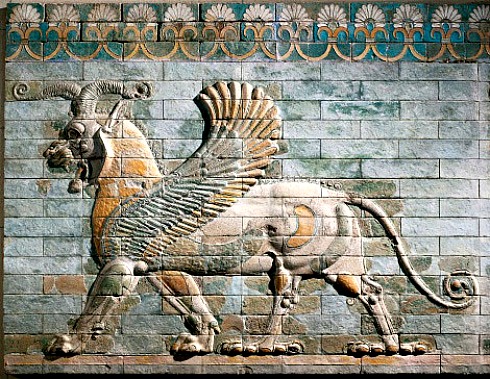
Frieze depicting griffin of glazed brick, from Palace of Darius I, from Shush (ancient Susa), Iran
The sight of vast graves opening and the undead clawing out should unnerve us all. But we haven’t even noticed. As more blood flows than any horror film offers, it’s brought the hope of eternal life to bygone empires we all thought dead and buried — and good riddance.
Blinded by the flash of headline events, we fail to see the strategic arcs of our era: the agonized collapse of Europe’s empires — climaxing in the Soviet Union’s demise — and now, amid the chaos and fanaticism, the belief on the part of once-mighty powers that they can rebuild fallen empires.
History is vengeful toward the ignorant. And we’re historically illiterate.
A Turkish attempt to establish a neo-Ottoman Empire failed (none of their neighbors wanted the Turks back), but three other imperia have gotten at least one foot out of the grave: the Persian Empire, the Arab Caliphate and the Russian Empire.
Not one means us well.
The Persian Empire
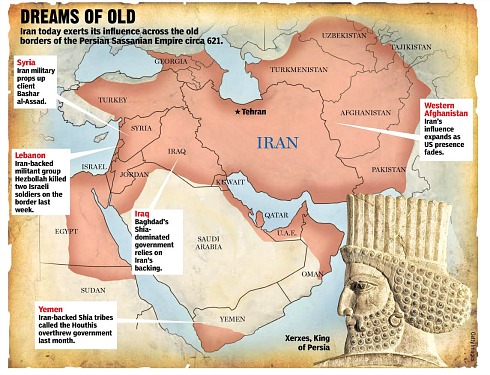
Iran is piling one brick on the other. As I’ve warned on Fox News and Charles Krauthammer described — eloquently — in The Washington Post, today’s Iranians, with their Persian heritage, are on the march as surely as were the armies of Xerxes 2,500 years ago. Desperate for a legacy, our president obsesses about a deal (no matter how wretched) on Iran’s nuclear program, while ignoring Iran’s aggression across the Middle East. In his recent State of the Union message, the president even defended Iran against Congress and further sanctions.
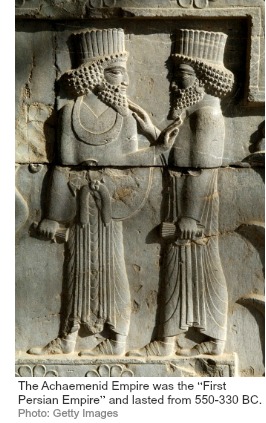 Iran’s pursuit of nuclear weapons matters. It’s a potential strategic disruptor of the first magnitude. But it’s only one aspect of Tehran’s grand design. And a bad deal is worse than no deal. To date, Iran has given up nothing, while we’ve given its rulers time, sanctions relief and almost $12 billion in “unfrozen” assets.
Iran’s pursuit of nuclear weapons matters. It’s a potential strategic disruptor of the first magnitude. But it’s only one aspect of Tehran’s grand design. And a bad deal is worse than no deal. To date, Iran has given up nothing, while we’ve given its rulers time, sanctions relief and almost $12 billion in “unfrozen” assets.
And what are the modern Persians doing as they drag out the talks? Iran has established hegemony over western Afghanistan. The junta-for-Allah has turned the Shia rump of Iraq into a vassal state and our president’s “no-boots-on-the-ground” minimalism has led to American airpower serving Iran’s ends against the Islamic State.
If the caliphate is rolled back, Iran will control the territory regained. And not just in Iraq. Syria long has been Iran’s client state. Now it’s become a vassal. If the Assad regime survives — which it probably will — Syria, too, will pay tribute to the reborn Persian empire.
Through Hezbollah, Tehran dominates Lebanese politics. And our refusal to directly arm the Kurds (as we continue pretending that Iraq can be nursed back to health) drives our only allies amid the Islamic State chaos into the arms of Iran for their own protection.
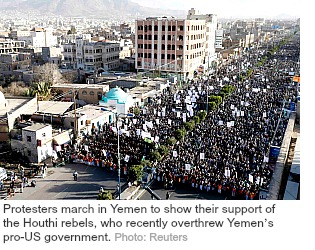 The Iran-backed Houthi rebels — fellow Shia — just overthrew Yemen’s feeble pro-US government. And Yemen borders the Kingdom of Saudi Arabia, our ally of inconvenience, which faces a leadership transition amid a web of regional crises. The Saudis may have to intervene in Yemen. And the ruling family’s terrified that the expensively armed Saudi military will be exposed as a hollow force.
The Iran-backed Houthi rebels — fellow Shia — just overthrew Yemen’s feeble pro-US government. And Yemen borders the Kingdom of Saudi Arabia, our ally of inconvenience, which faces a leadership transition amid a web of regional crises. The Saudis may have to intervene in Yemen. And the ruling family’s terrified that the expensively armed Saudi military will be exposed as a hollow force.
Nor have the Iranians given up on swallowing Shia-dominated Bahrain.
Even leaving the existential threat to Israel aside, the mere possession of nukes by Iran would make it the hegemon of the Persian Gulf and all its oil.
What’s striking is the power of history and heritage. The first Persian Empire matured in the 6th century BC. That was the empire that sent vast armies of revenuers against the stubborn hillbillies of Greece. We see history from the Greek perspective and through cartoonish films such as “300,” but that vilified Persian Empire was a milestone of civilization, its culture rich and original. Even Alexander the Great was awed by Persia’s “lifestyle,” and only the coming of Islam in the next millennium triggered Persian decay.
Other empires — Hittites, Assyrians, Babylonians — disappeared, but Persian language and culture conquered conquerors, and Persian pride is powerful and enduring. When Americans rant about quick bombing campaigns or claim that the average Iranian longs to rally to us, we’re being delusional. Unlike the eternally fratricidal Arabs, Persians have a unified ethnic identity, reinforced by Shia Islam. Iran’s already a formidable enemy. A reborn Persian Empire with nukes would shake the world.
The Arab caliphate
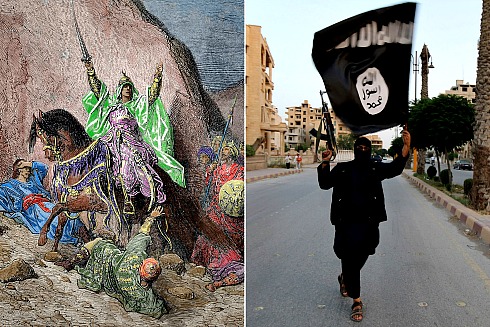
ISIS craves the old empire of Saladin the Turk, the first Sultan of Egypt and Syria, who founded the Ayyubid dynasty and ruled from 1174–1193. Photo: Reuters (right)
There may be more misunderstandings about the “great age” of the Arab Caliphate than about any other bygone empire. First, it wasn’t spoiled by the Crusades, a brief annoyance confined to a coastal strip. The Arab caliphate was shattered by the Mongols. The Seljuk and, particularly, the Ottoman Turks, established their own empires on the ruins — and declared the Ottoman sultan the new caliph.
Unlike the Persians, who built their own civilization, the Arabs came from a nomad culture, zealots of a new faith cribbed from muddled Christian and Jewish teachings. Learning and arts relied on Greek-speaking bureaucrats and scholars, on Jewish doctors and philosophers, on Persian artists and architects. The Arab caliphate was a pastiche glued together by force of arms. When its military authority collapsed, there was nothing left but a retreat into stern religion and cultural indolence.
“Arab identity” is a fiction that crushes together tribal Libyans and urban Egyptians, Sudanese and Syrians, the Mediterranean culture of Lebanon and the barbarism of Yemen. Cold War-era efforts to achieve unity through pan-Arab nationalism foundered on the differences. Islam is something else. Far more powerful even than a shared language, the Sunni extremist call to revive the caliphate strikes deep chords.
The odds are against Islamic State or successor fanatics building and sustaining a sprawling caliphate. Extremists create a valley of death, not a Silicon Valley. The effort to revive the caliphate has ruptured the Arab world — while renewing the old collision of empires between Arabs and Persians. It’s a 7th century conflict replayed in the 21st century.
Tsar of all the Russias
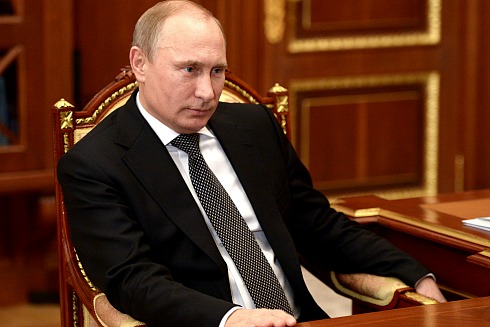
Photo: AP
In the euphoria of the 1990s, some of us who studied Russia tried to make Washington understand that, while governments might change, Russians would remain Russians (as Persians remain Persians and Arabs remain Arabs). No one wanted to hear it. In the Clinton years, Russia was the great arctic-white hope.
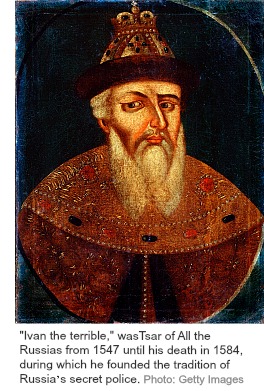 Welcome to reality. Russian President Vladimir Putin is a czar who possesses the iron will of such predecessors as Peter the Great and Ivan the Terrible (whose name, Ivan Grozniy, is better translated as “Ivan the Awesome,” a great name for a rapper). Ivan started the Russian Empire on its way by grabbing Siberia and conquering Muslim khanates. He also founded the tradition of Russia’s secret police, of which Putin’s an offspring.
Welcome to reality. Russian President Vladimir Putin is a czar who possesses the iron will of such predecessors as Peter the Great and Ivan the Terrible (whose name, Ivan Grozniy, is better translated as “Ivan the Awesome,” a great name for a rapper). Ivan started the Russian Empire on its way by grabbing Siberia and conquering Muslim khanates. He also founded the tradition of Russia’s secret police, of which Putin’s an offspring.
Putin sees himself as heir to those mighty czars. He has his own sense of history and destiny. The current economic crisis has barely slowed his program of re-conquest: His surrogates in eastern Ukraine are gobbling up more territory as you read this. Last month, our president took a lunatic victory lap, claiming that his policies had stopped Putin, but Putin will rule in Moscow long after Obama has left office.
And Putin means to rebuild the Russian Empire — not the Soviet Empire, but the Russian Empire. He thinks in terms of decades, while we’re trapped in election cycles. And Putin will fight.
Bottom line: We face three reawakening corpses from the graveyard of history, a Persian Empire whose origins date back 26 centuries; an Arab caliphate founded almost 1,400 years ago; and a Russian Empire born in the era between Henry VIII and Elizabeth the Great. All three menace our vision of the future and our security, even our long-term survival, should nuclear weapons (Iranian or Russian) come into play. And we’re not even paying attention.
Ralph Peters is Fox News’ Strategic Analyst.
Original article here.
Log In »
Notable Quotables
"Mr. Netanyahu is one of the most media-savvy politicians on the planet. On Friday he appeared live via video link on 'Real Time with Bill Maher,' taking the host’s alternately sardonic and serious line of questioning with gazelle-like alacrity."
~ Anthony Grant, jourrnalist who has written for many major newspapers and worked in television at Paris and Tel Aviv, interviewing former PM Benjamin Netanyahu on Monday, at the outset of Mr. Netanyahu's new book (more here).


